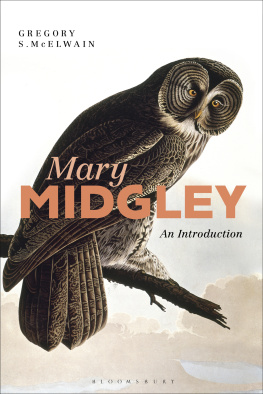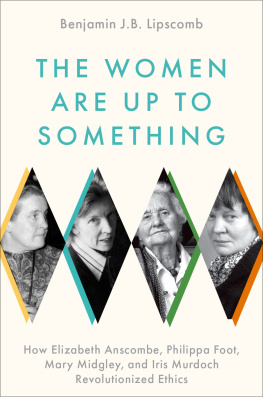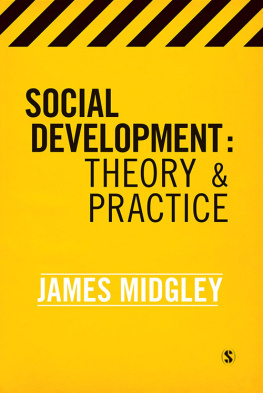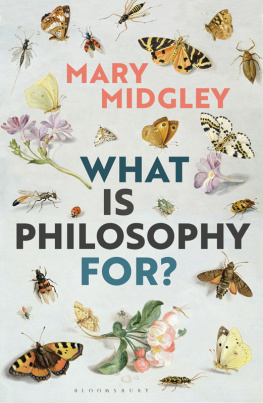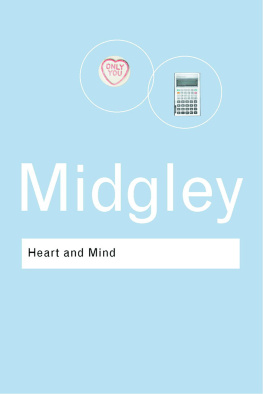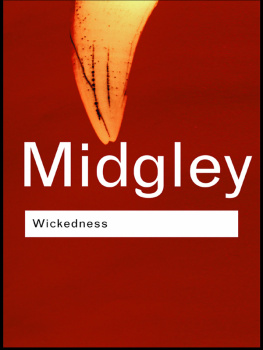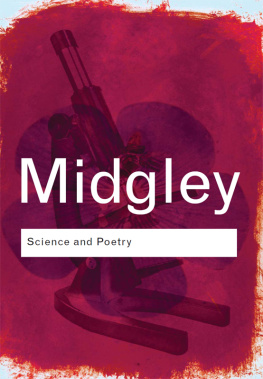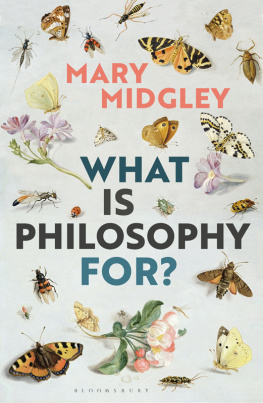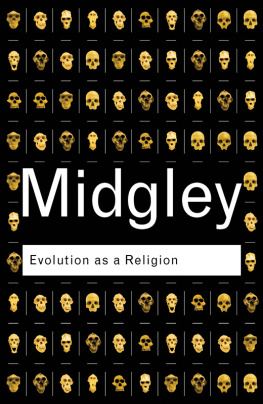Mary Midgley
Also available from Bloomsbury
What Is Philosophy For? Mary Midgley
Cant We Make Moral Judgements? Mary Midgley
The History of Animals: A Philosophy, Oxana Timofeeva
To the memory of Mary Midgley (19192018)
Mary Midgley
An Introduction
GREGORY S. MCELWAIN

Contents
This book would not have been possible without the support of many people along the way. Id first like to thank the whole team at Bloomsbury for their help and support in bringing this book to fruition. Im also grateful to the many friends and colleagues who generously provided feedback on various chapters of the book: Amy Brown, Luke Coddington, Katie Devine, Ian J. Kidd, Lucas Johnston, Todd LeVasseur, Benjamin Lipscomb, Kendall Marchman, Liz McKinnell, Anna Peterson, Holmes Rolston III, Elizabeth Wakeman, Jen Wallin-Ruschman, and Rachael Wiseman. This interdisciplinary collection of scholars (whose specialties include gender, neuroscience, astrophysics, philosophy of religion, sustainability studies, environmental studies, ethical theory, religious studies, political philosophy, animal ethics, religious ethics, environmental philosophy, feminist philosophy, community psychology, and philosophy of mind, among others) is a testament to the expansive scope and relevance of Midgleys thought. I am also thankful for the help of Skylar Barsanti and Max Schaffner, who read, edited, and provided feedback on the entire manuscript. Thanks also are due to the anonymous reviewer who provided feedback on the initial draft of the manuscript for Bloomsbury.
One of the highlights of this project, which deserves special mention, was to receive contributions and input from the late Mary Warnock (19242019). It has been a real pleasure interacting with such inimitable philosophical legends.
I must acknowledge Taylor & Francis and Les ateliers de lthique/The Ethics Forum for permissions to rework portions of two publications into this volume, which appeared previously as Gregory S. McElwain, The Mixed Community, in Science and the Self: Animals, Evolution, and Ethics: Essays in Honour of Mary Midgley , eds. Ian James Kidd and Liz McKinnell, 4151 (2015), and Gregory S. McElwain, Midgley at the Intersection of Animal and Environmental Ethics, Les Ateliers de lthique/the Ethics Forum 13, no. 1 (2018): 14358. The latter was published under a creative commons license, Attribution 4.0 International (CC BY 4.0) (https://creativecommons.org/licenses/by/4.0/legalcode). This project was, furthermore, generously supported over the years by funding from the Faculty Growth and Development and the National Endowment for the Humanities funds at The College of Idaho. I have also received tremendous support from my colleagues in the Philosophy and Religious Studies Department at The College of Idaho.
I am, naturally, deeply grateful for Mary Midgleys time and accessibility over the years, and for permissions to use portions of our yearly interviews from 2011 to 2018 in the book. I am also honored by her work on the foreword to this book, which was never completed. Midgley largely influenced my intellectual and professional direction, and it has been a truly wonderful process getting to know her over the years. I can only hope this volume does justice to such a profound and prescient thinker. She was a mentor and an inspiration, and I will always be grateful for our visits in Newcastle.
And, finally, words cannot express my love and gratitude for Alyson, Emily, and my entire family.
How to think involves how to live.
Mary Midgley once argued that, among other things, philosophy is like plumbing. Like plumbing, our thought is supported by a complex underlying structure. And, like plumbing, this structure or network largely goes unnoticedwe rely on it for essential tasks and needs, and it more or less supports our everyday lives. That is, until something goes wrong. Overlooked thought patterns, like faults in the pipework, can slowly undermine the integrity of the entire system. These faults can be hard to repair, as they are often hard to locate and buried beneath the surface as part of a network that was never consciously planned as a whole. Typically the result of years of neglect, these faults require repairs if we are to carry on with life. Our thought patterns, in other words, are essential to our lives and require maintenance and repair to ensure their proper functioning. Midgley argues that, just as plumbers specialize in care and maintenance of drains and pipes, philosophers specialize in the care and maintenance of our thought patterns.
Midgleys plumbing metaphor is about the necessity of philosophy. Philosophy is, indeed, grand and elegant, and worthy of pursuing as an end in itself. This she agrees. Yet, philosophy must remain grounded in the wider context of life, lest it become isolated and removedsomething of a venture separated and independent from the rest of life. This independence can be perceived as intrinsic to the practice,
To stick with the plumbing metaphor, we may not always notice when something goes wrong with our thoughts and concepts. At least not initially. But as with plumbing problems, we tend to notice that something is off, that life is going badly. Yet, this careful and meticulous work is indispensable if we are to find ways of dealing with the problems and conflicts that surface in our lives.
Philosophy, Midgley writes, like speaking prose, is something we have to do all our lives, well or badly, whether we notice it or not. What usually forces us to notice it is conflict. These conceptual schemes, which are many, are largely the province of philosophy.
When our concepts go awryas with, for instance, the runaway individualism of contract thoughtphilosophers are, in turn, the specialists to call. Conceptual repair is urgent business, as faulty concepts and visions of the world quietly distort and obstruct our thinking and, in turn, influence everyday life. They help us to think more clearly.
Thus, Midgley argues, philosophers help us sort through the complex concepts and patterns of thought that ultimately support and influence our everyday lives. In this way, philosophy is a practical necessity. But it also plays a visionary role. Philosophy is not just the logical task of analyzing concepts and ideas. Though this difficult and disciplined work is essential in clarifying the conceptual tangles that hamper our thoughts and lives, it is not the whole of philosophy. Philosophy contains a visionary aspect that provides imaginative direction for life. Great philosophers, Midgley writes, need a combination of gifts that is rare. They must have both the new vision that points the way we are to go and the logical doggedness that sorts out just what is, and what is not, involved in going there.thinking can result in fantasy and idealism. The challenge, and the promise of philosophy, is in this delicate balance of critical analysis and visionary direction.
A philosophy for life
Though Midgley was far too modest to ever claim the status of great philosopher, she clearly and accessibly exhibits the rare combination of skills and talents required of great philosophers. As with most great philosophers, she not only helps us work through various conceptual tangles but also offers visions of the way forward and direction on how to get there. For Midgley, this often involves working through the hidden system of ideas that lie underneath our notions of human nature and our connection to each other and the natural world. Patterns of thought give rise to myths, and myths, in turn, influence the way we think.

